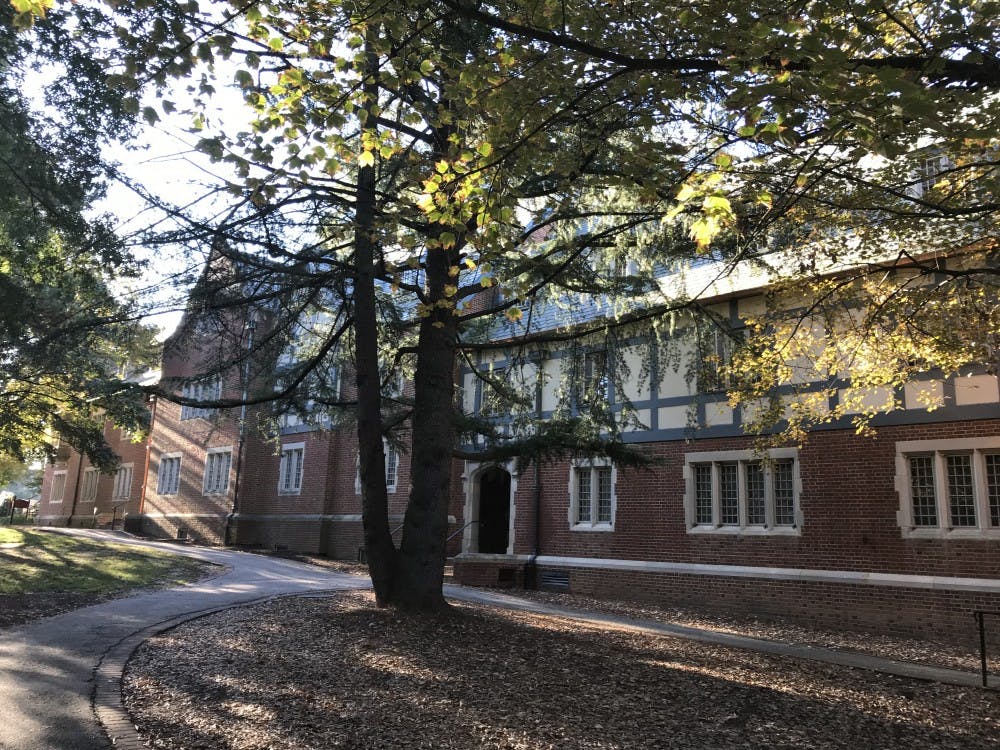Editor's note: Steve Bisese was promoted from dean of Richmond College to vice president for student development in 2006. He initially came to the University of Richmond in the 1980s. The article originally said, "Since coming to the University of Richmond in 2006, Bisese has accumulated a large collection of binders." The article has since been corrected.
Tucked away on the third floor of the Tyler Haynes Commons, Steve Bisese, vice president for student development, stands up from the desk in his office and walks toward his bookshelf.
The bookshelf is unique, not only because it covers the entire wall of his office from floor-to-ceiling, but also because it contains no books.
Instead, it is filled entirely with binders.
“People always make fun of me for my binders,” he laughs as he thumbs through a row of navy blue, three-ringed binders.
Since coming to the University of Richmond in the 1980s, Bisese has accumulated a large collection of binders. They contain detailed documents and reports of initiatives throughout the years that have modified student life at the university.
On the bottom shelf of the bookcase, Bisese has started a new series of binders, labeled “QEP,” which he hopes will someday have a similar impact on the university.
The QEP, or “Quality Enhancement Plan,” is a part of UR's accreditation process. Every 10 years the university is required by the Southern Association of Colleges and Schools (SACS) to develop a QEP, which focuses on improving student learning outcomes.
SACS defines student learning broadly but states: “In all cases, the goals and evaluation strategies [of the QEP] need to be clearly and directly linked to improving the quality of student learning and be consistent with the institution’s strategic plan.”
The last QEP resulted in the creation of the Sophomore Scholars in Residence (SSIR) program, which combines a traditional academic course with co-curricular learning activities. Students in the SSIR program live together in a co-ed residence hall, take a class as a community and take a trip related to the class. More than 20 percent of the current sophomore class participates in the SSIR program.
“What we want to try to do with the QEP is articulate and promote what is unique about studying at the University of Richmond,” Dean Patrice Rankine, co-chair of the QEP steering committee, said.
Work for the current QEP, called the Richmond Endeavor Project, began in the spring of 2016 when former Provost Jacquelyn Fetrow organized the steering committee. The steering committee, which is co-chaired by Rankine and Bisese, created a selection committee, which worked throughout the fall of 2016 narrowing down a topic.
Enjoy what you're reading?
Signup for our newsletter
Members of the university community submitted ideas for the focus of the current QEP. Of the 49 suggestions, the committee chose to focus on the first-year experience.
“We decided on a first-year experience because it has the potential to really impact the culture at the university,” Rankine said. “In the same way [as the SSIR program], this QEP should be available to all of our students and should bring the same outcomes-based education to first-year students.”
Modeled after the successes of the SSIR program, the Richmond Endeavor will provide a yearlong, class-based living-learning experience to approximately 200 first-year students. Each living-learning community will consist of 16 students who will take a class together in the fall and complete a collaborative project in the spring.
Each course will start with the Roadmap pre-orientation program taught by the same faculty member who will lead the yearlong course. This faculty member will also serve as the student’s academic advisor.
“The major goal is to provide a distinctive first-year experience while creating an intellectual community outside of the classroom,” Andy Gurka, director of the Living-Learning and Roadmap Programs, said. “We already have the facilities to do that, and now we’re providing the programming.”
Next year there will be four Richmond Endeavor communities. The program will expand to include 14 communities over the next six years.
“We’re building it up slowly so we can work out the kinks along the way,” Gurka said.
The current co-ed first-year living-learning communities in Wood Hall have served as pilots for the Richmond Endeavor program. Students in the Richmond Endeavor will live as a cohort instead of within their specific program.
The Westhampton College and Richmond College student governments have representatives on the Development and Steering Committees. Student input has also been solicited through the student governments of the Jepson School of Leadership Studies, E. Claiborne Robins School of Business and the T.C. Williams School of Law.
“We recognize that this isn’t going to affect current students because this is for the next generation,” Bisese said. “But every time we’ve presented this to students, the support has been incredible. So many people have been involved in programs like Roadmap or SSIR, and they want future students to have the same great experiences as they had.”
Lindsey Paul, sophomore, WCGA class of 2020 president, served on the development committee.
“This is a really exciting time because the changes we make really have the potential to change the first-year experience,” Paul said.
A final draft of the Richmond Endeavor Program will be submitted in February 2018, and SACS will evaluate it in March.
“What we are trying to do is express our values and make certain that all first-year students have a memorable experience,” Rankine said. “You are only a first-year student once.”
Contact news writer Claire Mendelson at claire.mendelson@richmond.edu.
Support independent student media
You can make a tax-deductible donation by clicking the button below, which takes you to our secure PayPal account. The page is set up to receive contributions in whatever amount you designate. We look forward to using the money we raise to further our mission of providing honest and accurate information to students, faculty, staff, alumni and others in the general public.
Donate Now



